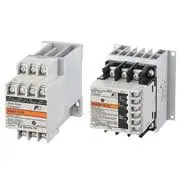Categories
- Contactors (Solid State)(0)
- 1
Solid State Contactors are switch devices that use semiconductor components such as thyristors or transistors as switching elements. They offer advantages like fast response, no interference, and no arc sparks, making them particularly suitable for environments where spark generation must be strictly prohibited. Known for their high reliability and long service life, Solid State Contactors are commonly used in automated control systems and precision equipment。
Solid State Contactors are electronic switching devices used to control the flow of electrical power in various applications, acting as an alternative to traditional electromechanical contactors. Unlike mechanical contactors that use moving parts to open and close electrical circuits, solid state contactors use semiconductors (such as thyristors, triacs, or power transistors) to switch circuits on or off. This design provides distinct advantages, including improved reliability, faster switching speeds, and reduced maintenance.

Contactors (Solid State)
How Solid State Contactors Work:
Solid state contactors control electrical circuits through solid-state electronics without mechanical movement. The input signal triggers a semiconductor, which changes its state to conduct or block the electrical current. This non-contact switching reduces wear and tear, leading to longer operational life and greater reliability.
Key Features of Solid State Contactors:
- High Durability: The absence of mechanical parts means there is no physical wear, which increases the lifespan of solid state contactors compared to traditional ones.
- Fast Switching: Solid state contactors can switch on and off rapidly, making them suitable for applications requiring high-speed operation or frequent cycling.
- Noise-Free Operation: As there are no moving parts, they operate silently, which is beneficial in environments where noise reduction is important.
- Vibration and Shock Resistance: Solid state contactors are resistant to mechanical shock and vibration, making them ideal for industrial and mobile applications where stability is a concern.
- Low Maintenance: Since there are no contacts that can degrade or require replacement, maintenance needs are minimal.
Applications of Solid State Contactors:
- Industrial Automation: Used in machinery that requires precise and frequent switching, such as conveyor systems and automated manufacturing processes.
- HVAC Systems: Commonly implemented to control motors and compressors due to their reliability and noise-free operation.
- Lighting Control: Ideal for managing high-intensity lighting systems where rapid and silent switching is necessary.
- Heaters and Ovens: Solid state contactors are used in temperature control applications to maintain consistent heating without mechanical wear.
- Renewable Energy Systems: Integrated into solar power inverters and wind turbines for efficient power control.
Benefits of Using Solid State Contactors:
- Extended Lifespan: Without physical contacts that can degrade, solid state contactors can last significantly longer than mechanical alternatives.
- Precision Control: They allow for more precise switching and faster response times, enabling better control of electrical loads.
- Reduced Downtime: Their reliable operation results in less unexpected downtime, which is especially valuable in industrial settings.
- Compact Design: Solid state contactors are often more compact than mechanical contactors, saving space in control panels and equipment.
Considerations When Using Solid State Contactors:
- Heat Dissipation: Solid state contactors can generate heat during operation, so adequate cooling or heat sinks are often necessary to maintain performance.
- Initial Cost: They may have a higher upfront cost compared to mechanical contactors, but the long-term benefits and reduced maintenance costs often outweigh this.
- Leakage Current: Even when off, solid state contactors may allow a small amount of leakage current to pass through, which can be a consideration in specific applications.
In Summary:
Solid state contactors offer a modern, reliable solution for power switching needs across various industries. Their benefits, such as long service life, rapid switching, and reduced maintenance, make them an attractive option for applications where precision and durability are critical. While they may come at a higher initial cost, their performance, especially in demanding environments, ensures a cost-effective solution over time.












